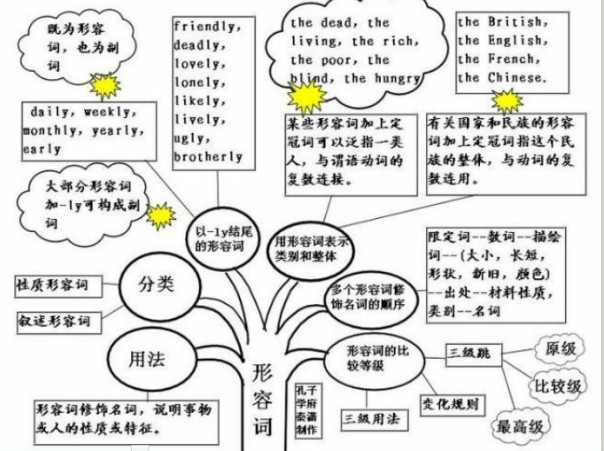本试题 “How _________the wonderful music on the TV _________to me!A. relaxed; soundsB. relaxing; is soundingC. relaxing; soundsD. relaxed; sound” 主要考查您对形容词
系动词
等考点的理解。关于这些考点您可以点击下面的选项卡查看详细档案。
- 形容词
- 系动词
形容词的概念:
形容词(adjective),简称adj.或a,形容词用来修饰名词或代词,表示人或事物的性质、状态,和特征的程度好坏与否,形容词在句中作定语、表语、宾语补足语。通常,可将形容词分成性质形容词和叙述形容词两类,其位置不一定都放在名词前面。
形容词的作用与位置:
形容词是用来修饰名词的,常被放在名词前作定语,或放在系动词后面作表语。以下属几种特殊情况,须牢记;
(1)形容词短语作定语,定语后置。
如:a language difficult to master,
a leaning tower about 180 feet high
(2)表语形容词(afraid、alike、alone、asleep、awake、alive等)作定语,定语后置。如a man alive。有些表身体健康状况的形容词如well、faint、ill只作表语。sick既可作表语又可作定语,ill如作定语意为“bad”。
(3)用作定语,修饰由不定代词one、no、any、some和every构成的复合词如anything、something等时,通常后置。
如:I have something important to tell you.
(4)else常用作疑问代词和不定代词的后置定语。
(5)enough、nearby修饰名词前置或后置,程度副词一般位于形容词、副词前面,enough修饰形容词、副词时,必须后置。
(6)几个并列的形容词作定语,其语序通常为:限定语(The、A)+描绘性形容词+size(大小)+shape(形状)+age(年龄、时间)+color(颜色)+origin(国籍、来源)+material(材料)+purpose(目的)+名词。
口诀:
限定描绘大长高,形状年龄和新老;颜色国籍跟材料,作用类别往后靠。
如:a heavy black Chinese steel umbrella,
the man's first tow interesting little red French oil paintings
形容词的用法:
1、形容词修饰名词,说明事物或人的性质或特征。通常,可将形容词分成性质形容词和叙述形容词两类,其位置不一定都放在名词前面:
1)直接说明事物的性质或特征的形容词是性质形容词,它有级的变化,可以用程度副词修饰,在句中可作定语、表语和补语。例如:hot热的。
2)叙述形容词只能作表语,所以又称为表语形容词。这类形容词没有级的变化,也不可用程度副词修饰。
大多数以a开头的形容词都属于这一类。例如:
afraid害怕的。(错)Heisanillman. (对)Themanisill. (错)Sheisanafraidgirl. (对)Thegirlisafraid.
这类词还有:well,unwell,ill,faint,afraid,alike,alive,alone,asleep,awake等。
3)形容词作定语修饰名词时,要放在名词的前边。但是如果形容词修饰以-thing为字尾的词语时,要放在这些词之后。例如:somethingnice
2、用形容词表示类别和整体:
1)某些形容词加上定冠词可以泛指一类人,与谓语动词的复数连接。如:the dead,the living,the rich,the poor,the blind,the hungry The poorarelosinghope.穷人失去了希望。
2)有关国家和民族的形容词加上定冠词指这个民族的整体,与动词的复数连用。如:the British,the English,the French,the Chinese. The English have wonderful senseofhumor.
以-ly结尾的形容词:
1)大部分形容词加-ly可构成副词。但friendly,deadly,lovely,lonely,likely,lively,ugly,brotherly,仍为形容词。改错:
如:(错)She sang lovely.
(错)He spoke to me very friendly.
(对)Her singing was lovely.
(对)He spoke to me in a very friendly way.
2)有些以-ly结尾既为形容词,也为副词。 daily,weekly,monthly,yearly,early .
如:The Times is a daily paper.
The Times is published daily.
形容词知识体系:

复合形容词的构成:
(1)形容词+名词+ed:
如:kind-hearted 好心的,white-haired 白发的
(2)形容词+形容词:
如:red-hot 炽热的,dark-blue 深蓝的
(3)形容词+现在分词:
如:good-looking 好看的,easy-going 随和的
(4)副词+现在分词:
如:hard-working 勤劳的,fast-moving 快速转动的
(5)副词+过去分词:
如:hard-won 得来不易的,newly-made 新建的
(6)名词+形容词:
如:life-long 终生的,world-famous 世界闻名的
(7)名词+现在分词:
如:peace-loving 爱好和平的,fun-loving 爱开玩笑的
(8)名词+过去分词:
如:snow-covered 白雪覆盖的,hand-made 手工的
(9)数词+名词+ed:
如:four-storeyed 4层楼的,three-legged 3条腿的
(10)数词+名词(名词用单数):
如:ten-year 10年的, two-man 两人的
系动词的概念:
连系动词(link verb)是一个表示谓语关系的动词。它必须后接表语(通常为名词或形容词)。连系动词的功能主要是把表语(名词、形容词、某些副词、非谓词、介词短语、从句)和它的主语联系在一起,说明主语的属性、特征或状态。它有自己的但不完全的词义,不能在句中独立作谓语,必须和后面的表语一起构成句子的谓语。它是虚词。
系动词的分类:
1、状态系动词:
用来表示主语状态,只有be一词。
例如:He is a teacher. 他是一名教师。(is与补足语一起说明主语的身份。)
2、持续系动词用来表示主语继续或保持一种状况或态度,主要有keep, rest, remain, stay, lie, stand:
例如:The weather will continue cold and wet.
He remained poor after 20years.
The shop will stay open at 11:00p.m.
He stood/sat silent there.
3、表像系动词:
用来表示"看起来像"这一概念,主要有seem, appear, look。
例如:She appears to have know this thing.
She seems a student.
4、感官系动词:
感官系动词主要有feel, smell, sound, taste。
例如:The silk feels soft.
Your idea sounds a good one.
He looked like his mother.
The mixture tasted terrible.
The flower smells sweet.
5、变化系动词:
这些系动词表示主语变成什么样,变化系动词主要有become, grow, turn, fall, get, go, come, run。
例如:My dream o fcoming to China has come true.
In summer food often goes bad.
He turned doctor./ He became a doctor.
He fell asleep as soon as he went to bed.
6、终止系动词表示主语已终止动作,主要有prove, turn out,表达"证实","变成"之意。
例如:The truth he stuck to proved true.
系动词基本用法:
连系动词是表示不完全谓语关系的动词,它与其后的表语一起构成谓语。
常见的连系动词有be(是),become(成为),get(变成),remain(还是),seem(似乎是),look(看上去),feel(感觉)等。
连系动词后的表语通常是名词和形容词,有时也可以是代词、数词、副词、介词短语、不定式、动名词、从句等:
如:His English is excellent. 他的英语很棒。(跟形容词)
He is a famous poet. 他是著名诗人。(跟名词)
Money isn't everything. 金钱不是一切。(跟代词)
She was the first to arrive. 她是第一个到达的人。(跟数词)
Who is up stairs? 谁在楼上?(跟副词)
He is with his friends. 他和朋友在一起。(跟介词短语)
He seems to be ill.他似乎病了。(跟不定式)
Seeing is believing. 眼见为实。(跟动名词)
This is what you need. 这就是你需要的。(跟从句)
注:有些系动词又是实义动词,该动词表达实义时,有词义,可单独作谓语。
例如:1、She tasted①the soup to see if it tasted②too salty. 她尝了一口汤,看是否太咸。
2、The doctor is feeling①his pulse because he feels②sick. 因为身体不舒服,医生正在给他切脉。
3、The mother looked①at the sick child sadly and she looked②sad. 母亲难过地看着生病的孩子。
4、She smelled①the meat to make sure it still smelled②good. 她闻了闻肉,看看是否还新鲜。
5、The teacher asked the students to keep②quite when they were keeping①everything in order. 当学生整理东西时,老师让他们保持安静。
从以例子不难出,标①的动词为实义动词,他们后跟有宾语;标②的动词为系动词,其后往往跟形容词、名词、不定式等作表语。
系动词知识体系:

连系动词使用应注意的两点:
1、关于连系动词后接副词作表语:
连系动词后通常可接形容词作表语,一般不接副词:
误:His English is very well. 他的英语很好。(应将well改为good)
误:Be carefully. 小心点。(应将carefully改为careful)
误:The soup tastes nicely. 这汤味道不错。(应将nicely改为nice)
但是,有时连系动词后也可接副词作表语,不过这主要限于in, on, off, out, away, behind, up, down, over, through, around, round, below, inside, outside等少数副词小品词以及here, there, upstairs, downstairs等少数表示地点或方位的副词:
如:Mother wasn't in last night. 母亲昨晚不在家。
The meeting was over at five. 会议五点结束。
Come along. The taxi is outside. 来吧,出租车在外面。
Mother is downstairs waiting for you. 母亲在楼下等你。
2、关于连系动词后接不定式:
(1)连系动词be后根据情况可自由地接不定式作表语:
如:My dream is to be a scientist. 我的梦想是当一名科学家。
All I could do was to wait. 我只能等。
My plan was to go from London to Paris. 我计划从伦敦去巴黎。
I was to have seen Mr Kay. 我本要去见凯先生的。
(2)seem, appear, prove, continue, turn out, get, grow, come等连系动词后也可接不定式(尤其是to be)作表语:
如:She always seems to be sad. 她常常显得很忧伤。
My advice proved to be wrong. 我的意见证明是错的。
She appears to have many friends. 他好像有很多朋友。
The weather turned out to be fine. 天气结果很好。
Circumstances continue to be favorable. 情况仍然是有利的。
He has grown to like studying English. 他渐渐喜欢学英语了。
【注】
若所接不定式为to be,通常可以省略。不过,若其后接的是表语形容词,则to be通常不宜省略。
另外,连系动词look后能否接tobe似乎尚有争论,不过,在现代英语中接to be的现象已较普遍。
(3)sound, smell, feel, taste, become等连系动词后通常不能接不定式:
误:These oranges taste to be good. (应去掉to be)
误:The roses smell to be nice.(应去掉to be)
(4)有的连系动词后接的从句可用不定式来改写:
如:It seems that she's right./ She seems to be right. 她似乎是对的。
It appears that you have made a mistake./You appear to have made a mistake. 似乎你弄错了。
与“How _________the wonderful music on the TV _________to me...”考查相似的试题有:
- --Hi, King, I heard you went to see the parrots instead of traveling to Calgary yesterday.--Yes, I did. You see, I'm ...
- ---Have you read the book?---Yes. But that one is _____worth reading. I suggest you______ it if you have time.A.best...
- Tom was __________ a happy childhood, ______ most people would like to have.A.filled with; oneB.blessed with; oneC...
- The animal is ______; we must do something to save it.A.dangerousB.a dangerC.in dangerD.dangerous one
- Many people like white color as it is a ______ of purity.[ ]A. symbolB. signC. signalD. example
- When Mom looked back on the early days of their marriage, she wondered how they had managedwith _______ money .[ ]A. ...
- It may have been unusually cold recently but experts say it's ________ for this time of year.A.normalB.formalC.ord...
- Local studies show that students from Liaoning Province Shiyan High School North Schoolare more ____ to be admitted i...
- 用sharp的正确形式完成句子1. This knife needs .2.The report was critical of the police.3. He was very with me when I ...
- —That was a question, How did you get it right?—I just tried my luckA.tightB.toughC.roughD.direct